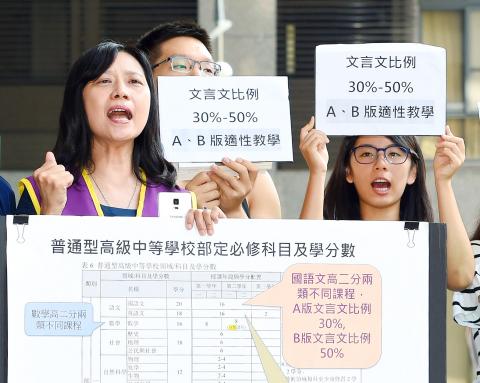A proposal by the curriculum review committee to reduce the proportion of classical Chinese content in high-school Chinese-language curricula to between 45 and 55 percent is to be upheld, Ministry of Education K-12 Education Administration Division head Chiu Chien-kuo (邱乾國) said yesterday.
A subcommittee had proposed a reduction to about 30 percent, but a meeting on the curriculum issue held by the ministry yesterday voted to maintain the original proposal by the committee, which is overseen by the National Academy for Educational Research.
Several other proposals were brought up during the meeting, including the complete elimination of classical Chinese from the curriculum guidelines to hand the decision to teachers, keeping the percentage at 40 to 50 percent, keeping it at 30 to 40 percent, and setting it at 30 percent, Chiu said.

Photo: Liao Chen-huei, Taipei Time
As no consensus could be reached, the meeting opted to go back to the original proposal of 45 to 55 percent, Chiu added.
The proposed change, which is expected to take effect in 2019, has elicited heated reactions from educators and the public, with many disagreeing about the importance of classical Chinese in modern Taiwanese education.
Yesterday’s meeting was attended by 45 of the 48 committee members who discussed eight curriculum changes. The classical Chinese issue was the seventh and most highly contentious of the issues discussed.
Outside the venue, student representative Hsiao Chu-chun (蕭竹均) spoke on behalf of student groups in Kaohsiung, Hsinchu and Changhua who are not content with the curricula.
The groups said that rote memorization of classical poetry — which accounts for 75 percent of high-school Chinese-language classwork and 90 percent of the literature portion of high-school entrance exams — fails to help students understand the significance of the poems while excluding other forms of literature.
Students said they are pressured to read modern texts on their own, given the pace of the classes and the focus on classical literature.
They supported a reduction to about 30 percent and called on the ministry to introduce more Taiwanese literature into the curriculum.
Meanwhile, members of groups including the National Education Action Alliance, the Taiwan Association for the Development of Adaptive Education, the Nationwide Twelve-Year National Education Parents’ Alliance and the Taiwan Early Childhood Education Association also protested outside the meeting venue, calling for implementation of split curricula allowing students to choose either an English-heavy or a classical Chinese-heavy course load.
The classical Chinese path would maintain current curricula while the English stream would reduce the ratio of classical Chinese texts to 30 percent, they said.

ANOTHER EMERGES: The CWA yesterday said this year’s fourth storm of the typhoon season had formed in the South China Sea, but was not expected to affect Taiwan Tropical Storm Gaemi has intensified slightly as it heads toward Taiwan, where it is expected to affect the country in the coming days, the Central Weather Administration (CWA) said yesterday. As of 8am yesterday, the 120km-radius storm was 800km southeast of Oluanpi (鵝鑾鼻), Taiwan’s southernmost tip, moving at 9kph northwest, the agency said. A sea warning for Gaemi could be issued tonight at the earliest, it said, adding that the storm is projected to be closest to Taiwan on Wednesday or Thursday. Gaemi’s potential effect on Taiwan remains unclear, as that would depend on its direction, radius and intensity, forecasters said. Former Weather Forecast

As COVID-19 cases in Japan have been increasing for 10 consecutive weeks, people should get vaccinated before visiting the nation, the Centers for Disease Control (CDC) said. The centers reported 773 hospitalizations and 124 deaths related to COVID-19 in Taiwan last week. CDC Epidemic Intelligence Center Director Guo Hung-wei (郭宏偉) on Tuesday said the number of weekly COVID-19 cases reported in Japan has been increasing since mid-May and surpassed 55,000 cases from July 8 to July 14. The average number of COVID-19 patients at Japan’s healthcare facilities that week was also 1.39 times that of the week before and KP.3 is the dominant

The Chinese Communist Party’s (CCP) working group for Taiwan-related policies is likely to be upgraded to a committee-level body, a report commissioned by the Mainland Affairs Council (MAC) said. As Chinese President Xi Jinping (習近平) is increasingly likely to upgrade the CCP’s Central Leading Group for Taiwan Affairs, Taiwanese authorities should prepare by researching Xi and the CCP, the report said. At the third plenary session of the 20th Central Committee of the CCP, which ended on Thursday last week, the party set a target of 2029 for the completion of some tasks, meaning that Xi is likely preparing to

US-CHINA TRADE DISPUTE: Despite Beijing’s offer of preferential treatment, the lure of China has dimmed as Taiwanese and international investors move out Japan and the US have become the favored destinations for Taiwanese graduates as China’s attraction has waned over the years, the Ministry of Labor said. According to the ministry’s latest income and employment advisory published this month, 3,215 Taiwanese university graduates from the class of 2020 went to Japan, surpassing for the first time the 2,881 graduates who went to China. A total of 2,300 graduates from the class of 2021 went to the US, compared with the 2,262 who went to China, the document showed. The trend continued for the class of 2023, of whom 1,460 went to Japan, 1,334 went to